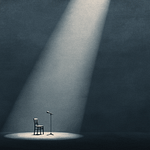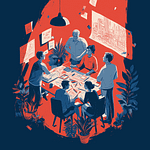There’s a divide running through how people approach problems—and it's wider than most realize.
When something goes wrong, or when a result falls short, one group immediately starts looking for systems to fix. They ask: What structure failed? What tool can we deploy? What action can we take right now? These are the thinkers of immediacy. The tacticians. Their first instinct is outward.
The other group looks inward. They ask: What belief drove this? What behavior enabled it? How did mindset, culture, or leadership contribute to this outcome? These are the philosophers. The behavioralists. They don’t ignore action—but they understand that action flows from attitude. That culture eats strategy for breakfast.
This divide is more than intellectual. It’s philosophical. And it shapes everything—how we lead, how we grow, and ultimately, how we perform.
I’ve lived on both sides of that line. Earlier in my life, I leaned on tactics. I sought the playbook, the process, the checklist. And sometimes it worked—until it didn’t. Until I realized that sustainable success wasn’t a matter of doing more things. It was a matter of becoming a certain kind of person, and building environments where others could become their best, too.
To illustrate this, I’ve often used a simple thought experiment. Suppose you take two identical companies: same market, same product, same fifty employees. One is handed to me. The other to someone else.
Now, I don’t say this with arrogance—but with conviction, humility, and experience: I believe my version of the business will outperform the other. Not because I’m smarter. Not because I have some secret strategy. But because I understand the engine of results isn’t found in tactics. It’s found in behavior.
Tactics are inputs. Behavior is the system that shapes the inputs—and multiplies them. You can hand two people the same blueprint and get two radically different outcomes. Why? Because one group believes. One group cares. One group shows up with urgency, optimism, ownership, and pride.
That doesn’t happen by accident. It happens because of how people are led. How they’re treated. What they’re trusted with. What’s tolerated—and what’s not. Energy, culture, clarity—these are not abstract concepts. They’re the soil where great outcomes grow.
But this is where the conversation often derails. People want a spreadsheet, not a spirit. They ask what tactic created the momentum, not what belief sustained it. They chase tools instead of trust. And then they wonder why it all slips through their fingers the moment pressure shows up.
It’s tempting to believe performance lives in structure. That the secret to success is the right system, dashboard, or quarterly OKR. But systems are reflections of people. They encode the behavior already in place—or the behavior you wish you had. If the team doesn’t believe, if the values are hollow, if the standard is low, no system will save you.
The Stoics knew this. Marcus Aurelius wrote, “You have power over your mind—not outside events. Realize this, and you will find strength.” What he was describing wasn’t passivity. It was the ultimate form of agency. The realization that how you respond to life determines the shape of your life. That inner mastery creates outer outcomes.
I’ve seen this play out in business, in the military, in relationships. Behavior drives results. Not just once—but repeatedly. Culture isn’t a nice-to-have. It’s the whole game. Because when behavior is right, you don’t need to micromanage. People solve problems before you even know they exist. They lift each other. They care. And that’s when the exponential kicks in.
We’re surrounded by organizations that look great on paper and fall apart in practice. Why? Because they’ve optimized for tactics, not truth. They’ve built systems, but not belief. They’ve mastered the art of doing, but not the discipline of being.
So if you find yourself stuck—if your business, your team, your life is underperforming—don’t just ask what needs to change. Ask how you’re showing up. What are you modeling? What are you tolerating? What kind of energy are you putting into the room?
Tactics matter. But they are second-order effects. The primary engine is always behavior.
The leaders who truly make a difference—who build things that last, that scale, that inspire—understand this. They don’t just design systems. They shape culture. They don’t just set goals. They set standards. And they don’t just drive outcomes. They cultivate belief.
Because in the end, your greatest competitive advantage is not the tools you use—but the people you trust, the energy you nurture, and the behavior you refuse to compromise on.
Get that right—and the tactics will follow. Get it wrong—and no tactic will ever be enough.
If this message challenged how you think about leadership and performance, share it with someone who needs to hear it.
Because in the end, your greatest advantage won’t come from your strategy—it’ll come from your standards.
New episodes drop every weekday on Substack, Apple Podcasts, and Spotify.
Subscribe, leave a review, and stay connected as we keep exploring what it takes to lead with courage, live with conviction, and build something that lasts.
Until next time—remember: the behavior you model becomes the culture you create. And that’s where real success begins.










